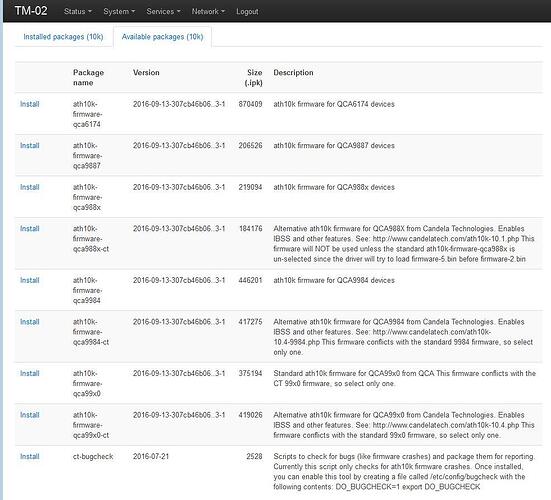[quote="RangerZ, post:9, topic:162, full:true"]There are 6 2800 related packages, 2 indicate USB, 1 MIMO, no 5572 drivers.[/quote]Ok, ok, I got it. I need to stop assuming all people here are linux users, sorry.
This is common practice for linux users, but it isn't obvious to others, so for the very least we need a "How to find a supported wifi/3g/whatever" in the wiki.
Here a more in-depth procedure (if you want to use this as a skeleton for a wiki article, feel free to):
Wikidevi lists existing devices and their specifications, so it is a good starting point. You find devices and look if they state a linux driver there.
For my usb wifi device they state that the linux driver is called rt-2800-usb (the name is usually the first chipset it supports, this driver likely covers more than one chipset. This is common in Linux)
If you want some more info about that driver you must search that driver name with google (the wiki linked by wikidevi is garbage), you would land on some linux distro wiki page or the driver developer's page where you get more info. Here Debian's https://wiki.debian.org/rt2800usb
The most crucial part is that the driver MUST be in mainline linux kernel as LEDE does NOT ship proprietary drivers at all (like most linux distros, anyway).
In this case, Debian wiki states:
"rt2800usb is a driver produced by the rt2x00 project, supporting Ralink 802.11n USB chipsets, introduced at Linux 2.6.31. "
Note the bolded part. This driver is in mainline Linux kernel since version 2.6.31 (ages ago, 2009 or something). LEDE is at kernel version 4.4 now (for most devices), drivers in mainline are RARELY dropped, so it's safe to assume that it still is in there.
Anyway, usually the driver name from wikidevi is enough.
On LEDE we have the package kmod-rt-2800-usb that provides that driver (all drivers are prefixed with kmod- as they are "kernel modules", the linux naming for "driver").
[quote]Following the links from wikidevi, there is no clear indication for either that they actually support 5G.[/quote]Yep, I had to google around on my own to confirm that. I can also confirm personally that this device works fine in 5Ghz.
Both antennas seem to be used for both frequencies though (if I detach one, signal drops on both frequencies) and the stock antennas are for 2.4Ghz (of course) so it will perform a bit meh on 5Ghz until you replace one of the two antennas with a 5Ghz one (possibly directional, but I digress).
In general, a good place to search for better info and more powerful cards is the forums of the penetration testing suites and distributions like for example Kali Linux. (penetration testing = they try to crack your wifi like the bad guys do, to make sure that it is safe)
For penetration testing they need the best chipsets as they need to support special features and have better range. And since Kali Linux is Debian, again the driver must be in Linux or the card won't work.
[quote]Maybe we can agree to disagree here. While not the highest priority, a stated project goal is improved documentation.[/quote]No, I agree with this but I'm just pointing out that the issue here is upstream, Linux as a whole does not have decent documentation on these things so you need to have a good google-fu to find anything. The same issues plague also Ubuntu, or Debian, or OpenSUSE or whatever other linux distro.
I didn't buy that usb wifi dongle for LEDE, I'm using OpenSUSE (Linux) on my PCs, and I needed a decent longer-ranged dongle for the laptop as the integrated card was meh (from kernel 4.x it got supercharged, but that's another story).
[quote]Centralizing this info in one place is a better solution.[/quote]Yes, but the issue is that you have info all over the place, any such thing would require much effort to be anything more than a drop in the ocean (like listing a few dozen devices a few users decided to take the time to load in the table).
